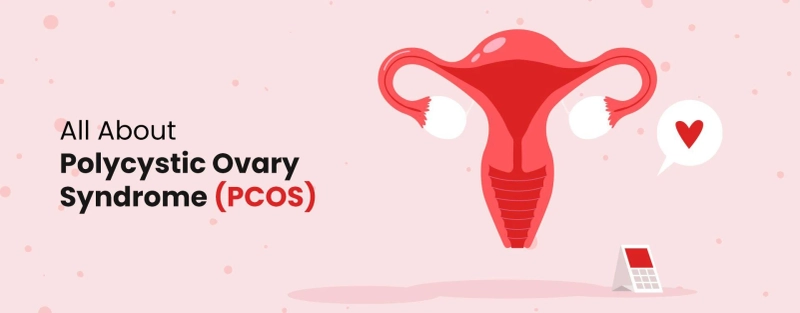PCOS is a hormonal condition that affects women throughout their reproductive years (ages 15 to 44). Between 2.2 and 26.7 percent of women in this age range have PCOS. Many women are unaware that they have PCOS. According to one research, up to 70% of women with PCOS go untreated. PCOS is a condition that affects a woman's ovaries, which are reproductive organs that generate estrogen and progesterone. The menstrual cycle is regulated by these hormones. The ovaries also create male hormones such as androgens in small amounts. However, PCOS causes the creation of extra male hormones that a female should have. Hormonal imbalances may cause hair growth on the face and body, as well as menstruation irregularities, making it harder for a woman to conceive.
If you are looking to tackle your PCOS for good, consult Dr. Deepika Doshi the best Gynecologist in Borivali.
Follicle-stimulating hormone (FSH) and luteinizing hormone (LH) are produced by the pituitary gland and control ovulation (the monthly release of an ovum). PCOS has an impact on ovulation and the ovaries. The condition is distinguished by three major characteristics:
The ovary has many folliclesExcessive levels of male hormonesInconsistent or missing periodsIn addition to affecting a woman's hormone levels, polycystic ovarian syndrome (PCOS) may lead to long-term health difficulties such as infertility, obesity, diabetes, and heart disease.
Causes of PCOS:
It might also be related to disorders that lead your body to produce an excessive amount of insulin, which can interfere with your ovaries' ability to ovulate.
How to prevent PCOS?
Overcome Insulin Resistance:
Understanding and overcoming insulin resistance is essential if you want to permanently eliminate PCOS. The good thing is that most instances of insulin resistance may be completely cured with a lifestyle adjustment. Consume a nutrient-dense, low-glycemic index, anti-inflammatory diet as a first step in reversing insulin resistance and PCOS.
Correct Significant Micronutrient Deficiencies:
It's vital to remember that you might be on a low-carb, low-fat, low-calorie, vegan, or vegetarian diet and yet have significant micronutrient deficiencies, placing you at risk for PCOS. Consume foods high in Vitamin B and D, as well as iron, magnesium, and zinc.
Toxin Elimination:
We are exposed to a number of toxins that may disrupt hormonal balance and increase the risk of disorders like PCOS. Endocrine-disrupting chemicals, or EDCs, are compounds that disrupt hormone synthesis, and the most frequently researched ones are found in plastics such as Bisphenol-A.
How to Avoid Toxin Exposure and Prevent PCOS:
Plastic food containers and drink bottles should be replaced with glass and stainless steel.Check for "green" alternatives in all skincare (cosmetic goods), home items, and other things.Consume only the cleanest, most natural meals and drinks available, including water.Increase Physical Activity: You must maintain a high level of physical activity to keep your blood glucose and insulin levels low, which helps to reduce insulin resistance. Although exercise is vital, it is equally important to remember that food is essential.Diet:
Many women who have always been physically active have acquired insulin resistance, type 2 diabetes, and PCOS as a result of a single factor:
inadequate diet and nutrition.
Eliminate Dairy Products:
Some study has linked PCOS to dairy intake, although the association is far from definitive. Dairy may increase testosterone production, exacerbating acne. As a result, women should avoid dairy for up to 3 to 4 weeks before resuming it to observe whether their symptoms worsen. Acne usually clears up completely at this time. Some women benefit from dairy abstinence, while others are content with restricting dairy consumption to no more than two servings per day and concentrating on fermented dairy.
Eat More Omega-3s:
While excessive dairy consumption might elevate androgen levels, one researcher discovered that consuming more Omega-3s can reduce them. These healthy fats are abundant in cold water fish nuts (especially walnuts), seeds, and egg yolks.
Treatment:
Male hormones cause unwanted symptoms such as hair growth on the face and body and acne. Doctors often recommend lifestyle modifications as the first line of therapy for PCOS, and they are frequently successful. Weight reduction may alleviate PCOS symptoms and boost your chances of conceiving. A combination of nutrition and aerobic activity may help you lose weight. If lifestyle changes do not work, medications are an option. Metformin and birth control tablets may both treat PCOS females by restoring normal hormone levels and menstrual cycles.
Do not hesitate to contact Dr. Deepika Doshi, a Gynecologist in Mumbai, if you have any questions about PCOS.
Also read: What causes high testosterone in women?
Thanks for reading!



